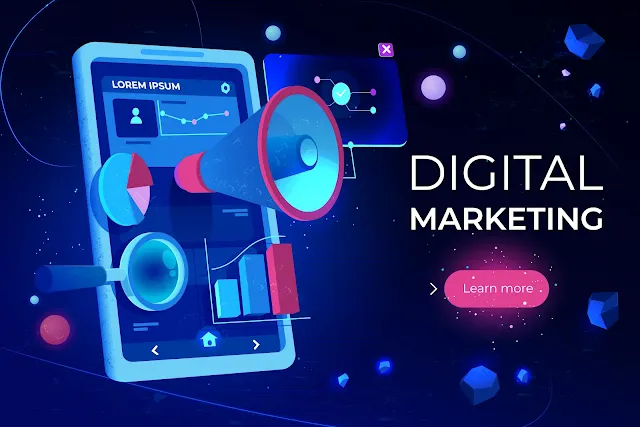 |
| Digital-Marketing |
Digital marketing is a broad field that encompasses various online strategies and tactics to promote products, services, or brands to a target audience through digital channels.
It has become an integral part of modern business and communication due to the increasing reliance on the internet and digital technologies.
In this overview, I'll provide a comprehensive look at digital marketing, covering its key components, strategies, and benefits.
Benefits of Digital Marketing:
1. Global Reach:
Digital marketing allows you to reach a vast and global audience, breaking down geographical barriers.
2. Targeted Advertising:
You can target specific demographics, interests, and behaviors, ensuring your marketing efforts are seen by the most relevant audience.
3. Cost-Effective:
Digital marketing often provides a better return on investment (ROI) compared to traditional advertising methods.
4. Measurable Results:
Digital marketing tools and analytics enable you to track and measure the performance of your campaigns in real-time.
5. Improved Customer Engagement:
Social media and email marketing allow for direct interaction with customers, building stronger relationships.
6. Flexibility and Adaptability:
Digital marketing allows you to quickly adapt to changing market conditions and adjust your strategies as needed.
7. Higher Conversion Rates:
Targeted marketing efforts and personalized content often lead to higher conversion rates and increased sales.
Key Components of Digital Marketing:
1. Website:
A well-designed and user-friendly website is the foundation of digital marketing. It serves as the central hub where potential customers can learn more about your business and offerings.
2. Content Marketing:
Content is king in digital marketing. This includes creating and sharing valuable, relevant, and consistent content to attract and engage your target audience.
Content can take various forms, such as blog posts, videos, infographics, and eBooks.
3. Search Engine Optimization (SEO):
SEO involves optimizing your website and content to rank higher in search engine results pages (SERPs). The goal is to increase organic (non-paid) traffic by improving your website's visibility for relevant keywords.
4. Search Engine Marketing (SEM):
SEM involves paid advertising on search engines like Google and Bing. It includes pay-per-click (PPC) advertising, where you bid on keywords to display your ads at the top of search results.
5. Social Media Marketing:
This involves promoting your brand and engaging with your audience on social media platforms such as Facebook, Twitter, Instagram, LinkedIn, and more.
6. Email Marketing:
Email marketing is a direct communication channel with your audience. It includes sending newsletters, promotional offers, and personalized messages to your subscribers.
7. Affiliate Marketing:
This is a performance-based marketing strategy where businesses reward affiliates for driving traffic or sales to their website through the affiliate's marketing efforts.
8. Content Management and Marketing Automation:
Tools and software are used to streamline marketing processes, schedule posts, and automate email campaigns, making digital marketing more efficient.
9. Analytics and Data Analysis:
Gathering and analyzing data from various digital marketing channels is essential for measuring the effectiveness of your campaigns and making data-driven decisions.
Digital Marketing Strategies:
1. Inbound Marketing:
This strategy focuses on creating valuable content that attracts potential customers to your website, converting them into leads, and nurturing them into loyal customers.
2. Social Media Advertising:
Paid advertising on social media platforms allows you to target specific demographics, interests, and behaviors, making it a highly effective way to reach your ideal audience.
3. Content Marketing:
Creating high-quality, relevant content not only helps with SEO but also establishes your brand as an authority in your industry.
4. Email Marketing Campaigns:
Email marketing is used for lead generation, customer retention, and promoting products or services through personalized messages.
5. Paid Search Advertising:
Using platforms like Google Ads to bid on keywords and display ads at the top of search results.
6. Affiliate Marketing Programs:
Partnering with affiliates or influencers to promote your products or services can expand your reach and drive sales.
At the end digital marketing is a multifaceted approach to reaching and engaging with your target audience online. It encompasses a wide range of strategies and tactics, all aimed at promoting your brand, products, or services in the digital realm.
By leveraging the power of digital marketing, businesses can increase their online visibility, attract and retain customers, and ultimately achieve their marketing goals.

If you have any doubts, please let me know